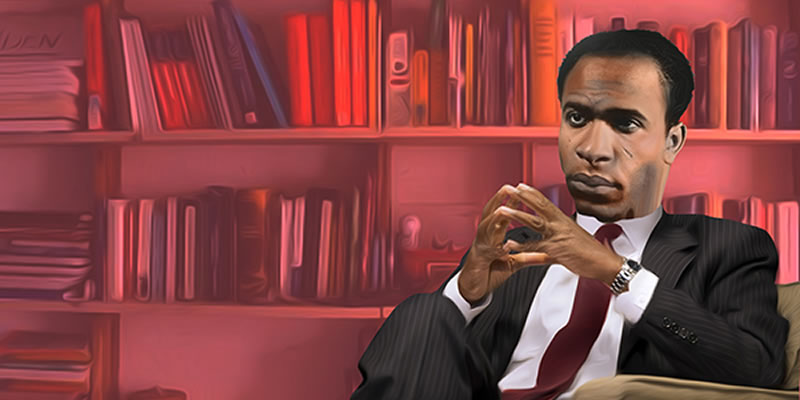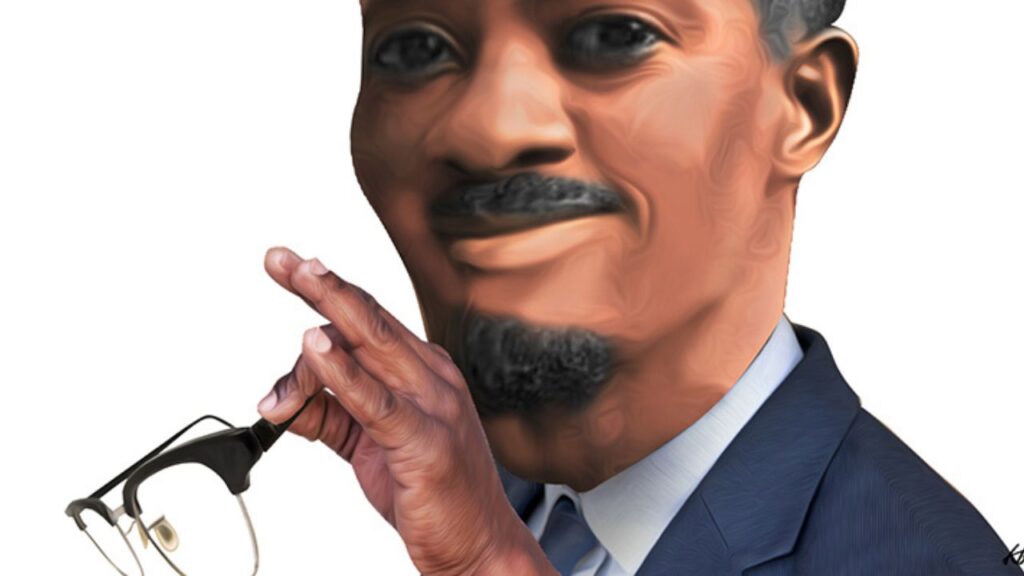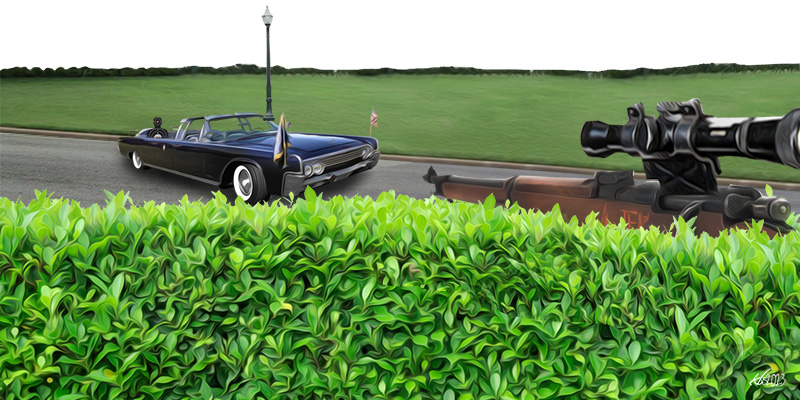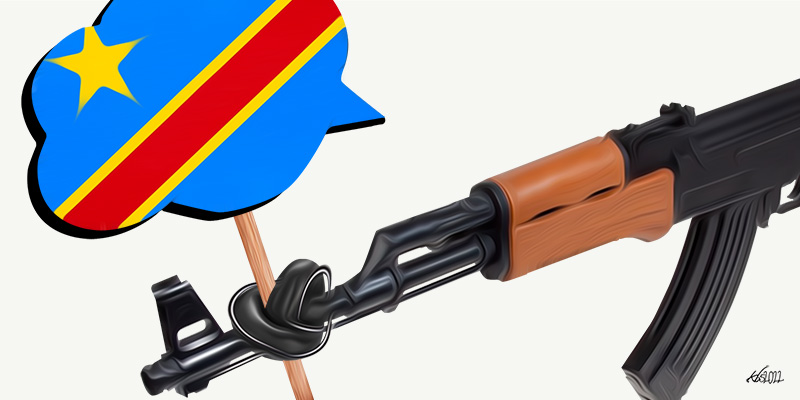Introduction:
Greetings and welcome to this podcast series, where The Elephant engages the question of “On National Culture”.
In this episode, our host Mshai Mwangola, a performance scholar, speaks to Godwin Murunga a historian and Senior Research Fellow at the Institute of Development Studies, University of Nairobi, setting the context for a series of conversations on National Culture.
Mshai:
So thank you, Godwin for agreeing to set us off on an exploration of national culture. We will be starting with a look at Frantz Fanon`s thoughts on what this meant; as articulated in the book The Wretched of the Earth.
But let’s start with Frantz Fanon himself.
Who is Frantz Fanon?
Godwin:
Frantz Fanon is one of the key critical thinkers around the question of national culture. But to understand the discussion on national culture, you have to understand where he comes from in his life. Broadly speaking, there at least six different countries that Frantz Fanon lived in which had serious implications on his thinking around national culture.
Born in Martinique in 1925, Fanon grew up in a family that was the equivalent of what in Kenya would be the middle-class. Remember that this was a colonial society, but it was also a racially stratified colonial system. Within the social context that he grew up in, most people in his social class tended to want to live the life of the upper White category, but Frantz Fanon reacted against this. [This was] partly because of his education under Aimé Césaire on Negritude; but also, partly because of his experience when he went to live in France after the Second World War. His reaction to this system essentially grew from the fact that he was unhappy with the fact that during the Second World War, he was being invited to fight against potential Nazi power, when in fact in his own home he lived under a culture that was as oppressive as what the Nazis threatened.
And so, he rebelled against that system and began to develop a kind of thinking that was against, not just colonialism, but also against a racially stratified structure. This was to influence his life, not just in France where he studied psychiatry; but also in Algeria where he was seconded to work in a hospital; also in Tunisia where he lived a significant segment of his life; in Ghana where he went to represent the Algerian Liberation Movement in the diplomatic service; but eventually also in the United States where he went for treatment following the discovery that he was suffering from leukaemia.
Mshai:
So Fanon… let’s just recap … left having grown up in Martinique where he became conscious of these identity issues – whether it is race, whether it is class – then goes on to France and he goes as a student…
Godwin:
Yes….
Mshai:
…but while he’s there, he`s invited to join the French army (I’m assuming, because he was in a colonised country), and then is deployed … under the French government to Algeria….
Godwin:
Yeah.
Mshai:
Okay.
Godwin:
So remember that Fanon left Martinique when he was eighteen years, and many of the things that he begins to experience while he is in France are things that he’s beginning to learn as he reconciles his own life in Martinique to new contexts in Paris.
One of the things that made a big change in his thinking was the fact that he noticed the French peasants were not interested in fighting in the Second World War. And it led him to ask the question: Why should I be fighting on behalf of France – right – when the French peasants don`t want to fight on behalf of France? And this represents a big transformation in his thinking. His decision to study psychiatry has a lot to do with his desire to begin to reconcile himself to these contradictions in his own life. Being black; while growing up in a racially stratified society; living in France where racism was stuck in your face; and beginning to ask questions. How do colonized people begin to deal with these kinds of contradictions in life?
So the outline of Frantz Fanon`s subsequent life – as a young man; but also eventually as an adult; as a professional; and as a fighter in the Algerian struggle of re-independence – has a lot to do with his attempt to reconcile himself to the contradictions of his society through medicine, and also eventually through his participation in the struggle for Algerian independence.
Mshai:
So when he went to work in Algeria, he was sent there by the French government. He was working as a psychiatrist. Yet the books that we know him for are not [totally about] psychiatry – they are not [really] medical texts; they are not scientific texts – so when did he make that transition?
Godwin:
The key transition for Frantz Fanon was his experience in the hospital where he went to work. Remember that working in that hospital he was exposed to French soldiers whom he had to treat following the horrors of war. But he was also exposed to Algerians who he was treating again because of the war. And it was in the contradictions in the various experiences he had [with] these patients that he began to take a decision about what violence means, what it does to the different people who are involved in that violence, and what the results of that violence are. And obviously in the context of this contradictions he took a very clear line which we can discuss in this podcast
Mshai:
Okay, and so after that then, his biggest investment is not psychiatry in the sense of a doctor treating one patient, but it becomes, if you want, analysing the sickness of the whole society, and how we can heal that society.
Could you say something about some of the books that he wrote?
Godwin:
Fanon wrote many [texts], some of which I have never read because they’re written in French. Four books however stand out very significantly.
The first one of course, is Black Skin, White Masks, which is a book that really begins to deal with the questions of alienation; alienation based on race. It’s one of the books that gets a lot of mention, especially in some parts of the world such as in the US and in the West Indies where he came from. It’s like a significant text, even today, among university students especially.
The second book which has had serious attention is A Dying Colonialism, which is a serious comment on the context of colonialism. The third book which is very closely related to A Dying Colonialism is The Wretched of the Earth, which we might want to spend a lot of time talking about, partly because it reflects a lot on our own context, both under colonialism but also in these modern times. The Wretched of the Earth essentially begins to deal with the question of violence: what does violence [mean] in a colonial context? where does it come from? how do the protagonists in a violence context deal with it? how is violence resolved? what does it mean for the attainment of Independence, both for the people and for the society at large? And the final book which I would like to make quick reference to is titled Towards an African Revolution which is a study that was published posthumously. It is a collection of essays that he wrote over a long period of time to different journals and different magazines as he reflected on some of these questions. Actually, when he died in the US in the 1960s, Frantz Fanon was still working on many of these essays which eventually end up being published in this final book. I know there are many other texts that had been written on his own reflections on the Algerian Revolution and all that, some of which touch on questions of gender and also touch on questions of liberation in general as well as reflecting that on the context of the overall society. We might perhaps have opportunity to have somebody talk about them who speaks both French and English.
Mshai:
Thank you very much for that introduction.
Now I want to go into detail with The Wretched of the Earth. This is the third book that you mentioned, and you said that this book is very important to us, and not only in terms of the colonial era, from which we are now fifty years plus away in Africa. We will come back to why you think it is important, but perhaps can you tell us a little bit more about this book?
Godwin:
I mentioned earlier that Black Skin, White Masks is a book that commands a lot of attention especially in the US and in more contemporary times, because it’s a book that deals with the racial question. However, The Wretched of the Earth still commands a lot of attention among many African thinkers – African intellectuals – broadly defined. I’m saying “broadly defined” because nowadays we tend to think of Fanon as that guy you go to university and read. But actually, when you think backwards, Fanon was the guy you read irrespective of whether you were in the university or not. He was a popular read for many constituencies.
Essentially, why was Fanon a popular read? One cannot think of a thinker who has analysed the question of colonial violence with the kind of clarity that Fanon did. He basically focused on settler societies in the context of African settler societies, which were largely societies that had a huge population of White settlers who lived in colonial societies they assumed that they would dominate forever. Algeria is one good example, but for practical purposes for The Elephant, Kenya is also a very good example. South Africa is another good example, and Zimbabwe and Namibia are also perfect examples.
And Fanon sought to understand the character of violence within settler colonies, his main argument being that violence in colonial settler societies has its specific dimensions. It emerges that violence is used to institute colonialism and it’s also used to sustain colonialism. If successful, violence becomes the medium by which settler colonialism is given a mark of permanence. But Fanon had discovered, out of his own experiences in Algeria, that in fact settler violence begets native violence – and I’m using the one word “native” advisedly here. He argued that precisely because of settler violence in support of colonialism, native anti-colonial violence rises in response to settler violence. It assumes almost the same character of the settler violence that was used. So the nakedness of that violence, the brutality of that violence, the dehumanizing alienating character of that violence, is what Fanon understood to be what “the natives” – he uses the words – “vomits back”. That’s the genesis of this kind of violence.
And although I know Fanon knew that violence in itself can be very bad, he decided to make a very good argument that in fact this violence plays a cathartic role. It’s a liberating form of violence. He actually inserts the caveat that without the response through violent means by the natives against the settler colonialism and settler violence, there can never be Independence.
Mshai:
So violence is not, in itself bad; it depends on how it is deployed and for what purpose?
Godwin:
It depends on the context within which its deployed; and the purposes for which it is deployed. In the particular case of [settler] colonialism in Africa, there is the fact that for there to be catharsis, there must be violence; and secondly for there to be Independence, there must be violence. He basically makes the argument that settler violence traps everybody into a system of violence; and that you cannot get out of settler colonialism unless you go through the process of violence that settler colonialism introduced in the first place. He sees this as a dialectic going back to the Hegelian, to the Marxist dialectic, that settler violence is the thesis in that dialectic; and that native response is the antithesis. And the resolution of that conflict is the attainment of catharsis, the attainment of Independence is what resolves that kind of violence. And he applied this not just to Algeria which is the case study he observed very well, Fanon makes mention of Kenya. He makes mention of the Mau Mau, and says part of the trouble with Mau Mau is that that the Mau Mau violence was never really acknowledged by the Rising African I think he refers to them as petty bourgeois, who were endorsed by the British government – you know the outgoing British government in Kenya – as the owners of Kenyan nationalism. His analysis of Kenyan nationalism basically says because it did not acknowledge Mau Mau, it never really resolved the contradiction of the violence in the White Settler Colony that Kenya was.
Mshai:
So I’m listening to you and you’re talking about violence; and basically the argument is that on one hand you have the settlers pushing – with violence; and then on the other hand you also have the freedom fighters; those ones who were fighting for liberation, pushing back. But now the people who come and become the leaders and the face of this violence, do not belong to the side that is pushing back, but come from elsewhere; in fact they’re on the side that is coming with the first push. And I want to come back to that in terms of where we are today.
But I’m trying to figure out where does culture come in?
Godwin:
First of all, let’s make the point that the struggle does not happen suspended above society: the struggle happens in society, right? And the Society is structured around a certain understanding of norms, of habits, of customs, or ways of understanding how people live. By that very fact that the struggle happens in society, you cannot then imagine a way which you isolate culture as sitting at the margins of the struggle itself. In fact, culture is what gives the struggle meaning; it is what gives the struggle for Independence its identity. So that the kinds of things that particular nationalist struggles deploy in order to attain their objectives have themselves been given meaning by the very society in which they come from. How people mobilize to fight – the choices they make around how to fight, when to fight, why to fight, who is involved in the struggle – are all informed by their own way of life. So culture sits at the heart of the struggle for independence. And culture defines what nationalism then means to this particular people.
Mshai:
And what we will be looking at in future podcasts is what is Fanon saying and how he makes that relationship [between culture and struggle make sense].
As we close I would like to ask you two questions. Who else is Fanon thinking with? Who is he in conversation with? Maybe you can give us one name that perhaps we can look at in future podcasts.
Secondly, so what? This was 50 years ago – 60 years ago – and we fought the colonialists, they left; and now we’re an independent country and Africa is an independent continent. So why is Fanon still important?
Godwin:
To your question number one… it’s a little bit unfair to just isolate only one person, because Frantz Fanon is in conversation directly or indirectly with a whole number of other thinkers.
Jean Paul Sartre is central to Fanon because he actually wrote the Preface of The Wretched of the Earth; and over time and over time actually begun to appreciate the struggles both from the Negritude point of view, but also all the way into the kinds of beliefs that Frantz Fanon brought to the fore. I could also mention that Frantz Fanon’s conversations indirectly and at times directly people like Malcolm X; with groups like the Black Panther movement in the US; people like Stokely Carmichael; and many others, all of whom drew inspiration from reading Fanon and knowing that actually the kinds of struggle they were involved in had happened before.
But perhaps for me, the most important one would be Amilcar Cabral. Amilcar Cabral had also been in involved in a similar struggle in Guinea. He had a very interesting conversation with Fanon in terms of which categories of society are most important in the struggle for independence, and how do you locate the question of violence in relation to some of these categories. You have to remember that Frantz Fanon was extremely dismissive of the peasantry as a critical category playing a role in National Liberation. He didn’t think that they had played a profound role and he seemed to say very nice things about the category he called lumpenproletariats – the prostitutes, the tram riders and all those people who, in Marxist language constitute the lumpenproletariats. And he said very positive things about this category of people, claiming that they played a very central role in the realization of the Algerian War of Independence. Rightly so, because the Algerian War of Independence was an urban war. It was fought within an urban context. Amilcar Cabral came from a totally different tradition having being an agriculturalist mobilizing farmers to fight the war of independence. And he had noted the particular fact that in his own context what would be the lumpenproletariats of Frantz Fanon in fact did play an extremely malleable role in the struggle for Independence. Amilcar Cabral makes the case that the peasants in his own context actually do play a significant role because he was able to mobilize them. The colonial powers were unable to infiltrate them with the kinds of ease that the malleability of the lumpenproletariats [allowed]. So it would be interesting to reflect upon independence and what that means, and who plays a central role in different contexts. Different people play very different roles.
To your question number two with respect as to why this is important. I think you have to go back to The Wretched of the Earth and read some of the interesting sections about “Pitfalls of National Consciousness” in which Fanon begins to raise questions about the experience of many African countries, at the point where they attained Independence. They have a new group of people in power who are not necessarily White, but who have actually assumed the behaviour of the exiting White Colonial masters. The fact of neo-colonialism; the fact that Africa would continue to be controlled by external forces, is something that Fanon seemed to have been more aware of before 1965 when he died at 36 years than many other thinkers. And today we still go through in many countries processes of governance, processes in the struggle for democracy, that reflect struggles that we should have been involved in the 1960s and 1970s. That we still struggle with those things tells you that Fanon is as relevant today as he was in 1965 when he died.
Mshai:
Godwin Murunga, thank you very much. This has been such a fascinating introduction. I wish we could go on for another 20-30 minutes. We will be picking up Amilcar Cabral, because he also wrote on national culture, and it would be great to have the two in conversation as they were then, but also to reflect on what that means for us today.








